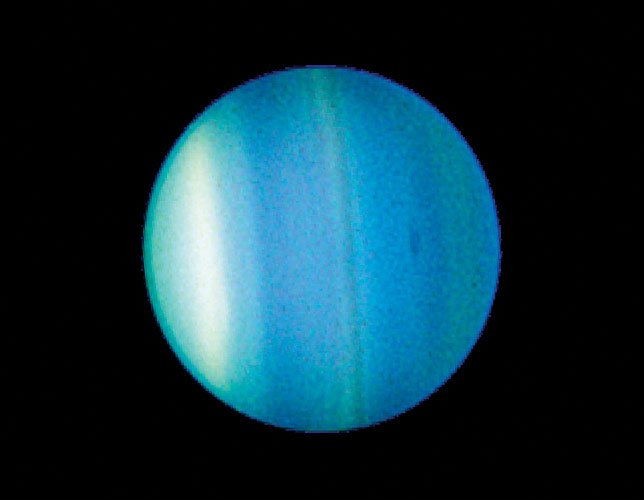20 March 2023
[22 March 2023: clarified the history of the pronunciation]
Uranus is the seventh planet and the first to be recognized as such in modern times. It is at the limits of human vision and can only be seen with the naked eye by keen observers in near-perfect conditions. Over the centuries it was observed multiple times, but because its orbital period is 84 years it was not recognized as a planet until the late eighteenth century.
In 128 BCE, the astronomer Hipparchos may have observed it and entered it into his star catalog. But it was definitely observed by John Flamsteed in 1690, who catalogued it as a star and labeled 34 Tauri. Other astronomers after Flamsteed also recorded it as a star.
The first to recognize that what would come to be called Uranus was not a star was English astronomer William Herschel, who observed it on 13 and 17 March 1781 and, seeing that the object had moved between those two dates, mistook it for a comet. He announced his discovery of the “comet” to the Royal Society on 26 April 1781. The following year, astronomers Anders Johan Lexell and Johann Elert Bode independently determined that the object’s orbital trajectory meant that it was a planet, not a comet.
Realizing his mistake and that he had discovered a new planet, Herschel decided to call it Georgium Sidus (George’s Star), after King George III. The Latinate name appears in A New Review of November 1782:
The observations of all the first astronomers of Europe concurring to prove the new star discovered by Mr. Herschel to be a primary planet, he, who, as the discoverer, has the best right to give it a name, wishes it to be called the Georgium Sidus, in honour of the Prince under whose reign it was discovered, and as a debt due to that Prince by Astronomy, for taking the discoverer from a mechanical employment, end enabling him to continue to enrich science.
Herschel described his naming process in a letter to naturalist Joseph Banks, which was published in the Philosophical Transactions of the Royal Society in 1783:
This consideration then makes it necessary to give it a name, by which it may be distinguished from the rest of the planets and fixed stars. In the fabulous ages of ancient times the appellations of Mercury, Venus, Mars, Jupiter, and Saturn, were given to the planets, as being the names of their principal heroes and divinities. In the present more philosophical æra, it would hardly be allowable to have recourse to the same method, and call on Juno, Apollo, Pallas, or Minerva, for a name to our new heavenly body. The first consideration in any particular event, or remarkable incident, seems to be its chronology: if in any future age it should be asked, when this last-found planet was discovered? It would be a very satisfactory answer to say, “In the reign of King George the Third.” As a philosopher then, the name of Georgium Sidus presents itself to me, as an appellation which will conveniently convey the information of the time and country where and when it was brought to view.
But in the meantime, Bode had dubbed the planet Uranus, after the father of Saturn in classical mythology. In 1784, Bode wrote:
Bereits in der am 12ten März 1782 bei der hiesigen naturforschenden Gesellschaft vorgelesenen Abhandlung, habe ich den Namen des Vaters vom Saturn, nemlich Uranos, oder wie er mit der lateinischen Endung gewöhnlicher ist, Uranus vorgeschlagen, und habe seit dem das Vergnügen gehabt, daß verschiedene Astronomen und Mathematiker in ihren Schriften oder in Briefen an mich, diese Benennung aufgenommen oder gebilligt.
(Previously in the treatise read at the local natural history society on 12th March 1782, I have proposed the name of the father of Saturn, that is Uranos, or as it is usually with the Latin suffix, Uranus, and since then I have had the pleasure of various astronomers and mathematicians, in their writings or letters to me, recording or approving this designation.)
Uranus quickly became the standard name throughout Europe, with only Britain, for obvious reasons, opting for Georgium Sidus. The name Georgium Sidus remained in regular British use until the mid nineteenth century, when long after George III’s death, the British astronomical establishment finally bowed to the inevitable and went along with the nomenclature everyone else was using.
Regarding the pronunciation of the planet’s name, in Greek (and classical Latin, which follows the Greek) the stress is on the first syllable. The traditional English pronunciation, however, which is presumably modeled after the pronunciation of Latin adjectives ending in -anus, as in Romanus or paganus, places the emphasis on the second syllable: /jʊˈreɪnəs/. But to avoid the inevitable laughter of schoolchildren, and those adults with minds like schoolchildren, nowadays it is often pronounced with the emphasis on the first syllable and a shift in the second vowel to a schwa: /ˈjʊrənəs/. But the original pronunciation is also problematic in that the first two syllables are pronounced like the word urine. Perhaps the only solution is Futurama’s:
Sources:
Bode, Johann Elert. Von dem neu entecten Planeten. Berlin: 1784, 88. Google Books.
Herschel, William. “Account of a Comet” (26 April 1781). Philosophical Transactions of the Royal Society, 71, Part 1 (1781) 492. HathiTrust Digital Archive.
———. “On the Name of the New Planet.” Philosophical Transactions of the Royal Society, 73 (1783) 1. In Philosophical Transactions (abridged), vol. 15 (1781–85). London: C. and R. Baldwin, 1809, 325. HathiTrust Digital Archive.
A New Review, November 1782, 438. Adam Matthew: Eighteenth Century Journals.
Oxford English Dictionary, third edition, March 2012, s.v. Uranus, n., Georgium Sidus, n.
Photo credit: NASA/Space Telescope Science Institute, 2009. Public domain image.
Video credit: Groening, Matt (creator), “A Big Piece of Garbage,” Futurama, Season 1, Episode 8, 11 May 1999. Fair use of a brief clip to illustrate the topic under discussion.

